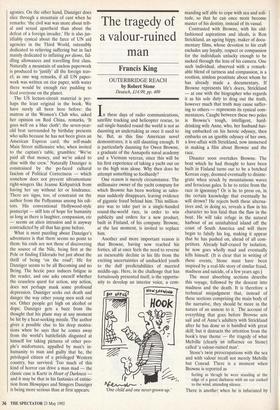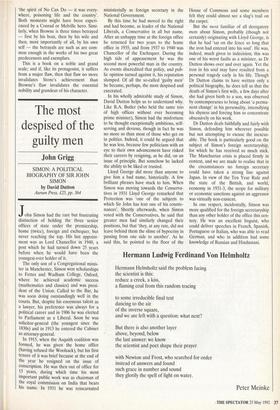The tragedy of a valour-ruined man
Francis King
OUTERBRIDGE REACH by Robert Stone Deutsch, £14.99, pp. 409 In these days of radio communications, satellite tracking and helicopter rescue, to sail single-handed round the world is not as daunting an undertaking as once it used to be. But, as this fine American novel demonstrates, it is still daunting enough. It is particularly daunting for Owen Browne, a graduate of the Annapolis naval academy and a Vietnam veteran, since this will be his first experience of taking a yacht out on to the high seas alone. Why then does he attempt something so foolhardy?
One reason is merely circumstance. The millionaire owner of the yacht company for which Browne has been working as sales- man suddenly disappears, leaving evidence of gigantic fraud behind him. This million- aire was to take part in a single-handed round-the-world race, in order to win publicity and orders for a new product, built in Finland, of his company. Browne, at the last moment, is invited to replace him.
Another and more important reason is that Browne, having now reached his forties, all at once feels the need to reverse an inexorable decline in his life from the exciting uncertainties of unshackled youth to the dull predictabilities of married middle-age. Here, in the challenge that has fortuitously presented itself, is• the opportu- nity to develop an interior voice, a com-
'One child and one never-grown-up.' manding self able to cope with sea and soli- tude, so that he can once more become master of his destiny, instead of its vassal.
Contrasted with Browne, with his old- fashioned aspirations and ideals, is Ron Strickland, an ageing hippy, maker of docu- mentary films, whose devotion to his craft excludes any loyalty, respect or compassion for the individuals unlucky enough to be sucked through the lens of his camera. One such individual, observed with a remark- able blend of tartness and compassion, is a rootless, aimless prostitute about whom he has already made a documentary. If Browne represents life's doers, Strickland — at one with the biographer who regards it as his sole duty to drag out the truth, however much that truth may cause suffer- ing to others — represents its cynical com- mentators. Caught between these two poles is Browne's tough, intelligent, hard- drinking wife Anne, who, her husband hav- ing embarked on his heroic odyssey, then embarks on an ignoble odyssey of her own, a love-affair with Strickland, now immersed in making a film about Browne and the race.
Disaster soon overtakes Browne. The boat which he had thought to have been built in Finland turns out to be a botched Korean copy, doomed eventually to disinte- grate when struck by mountainous waves and ferocious gales. Is he to retire from the race in ignominy? Or is he to press on, in the certain knowledge that eventually he will drown? He rejects both these alterna- tives and, in doing so, reveals a flaw in his character no less fatal than the flaw in the boat. He will take refuge in the natural harbour of an uninhabited island off the coast of South America and will there begin to falsify his log, making it appear that he has pushed on, ahead of all com- petitors. Already half-crazed by isolation, he now goes wholly mad and eventually kills himself. (It is clear that in writing of these events, Stone must have been inspired by a real-life story of similar fraud, madness and suicide, of a few years ago.) The most absorbing sections describe this voyage, followed by the descent into madness and the death. It is therefore a technical misjudgment that, instead of these sections comprising the main body of the narrative, they should be more in the nature of an annexe to it. The account of everything that goes before Browne sets sail and of Anne's adultery with Strickland after he has done so is handled with great skill; but it distracts the attention from the book's true theme — the tragedy of what Melville (clearly an influence on Stone) called 'a valour-ruined man'.
Stone's twin preoccupations with the sea and with valour recall not merely Melville but Conrad. There is a moment when Browne is reported as
feeling as though he were standing at the edge of a great darkness with an ear cocked to the wind, attending silence.
There is another when he is infuriated by
`the spirit of No Can Do — it was every- where, poisoning life and the country'. Both moments might have been experi- enced by a Conrad or Melville hero. Simi- larly, when Browne is three times betrayed — first by his boat, then by his wife and then, most importantly of all, by his own self — the betrayals are such as are com- mon enough in the works of his two great predecessors and exemplars.
This is a book on a noble and grand scale; and if, like its protagonist, it suffers from a major flaw, then that flaw no more invalidates Stone's achievement than Browne's flaw invalidates the essential nobility and grandeur of his character.



































































 Previous page
Previous page